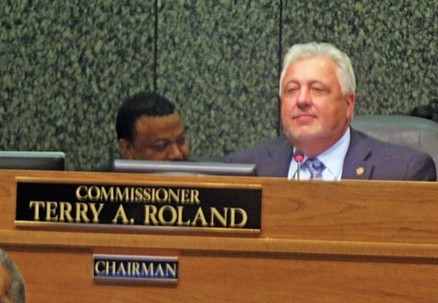God knows what will happen when the Shelby County Commission tangles with the deannexation issue — as it will, now that the legislature has its eye on the matter. The city of Memphis, self-protectively, has devised its own plan.
County government will, at some point, need to take a position — though in a sense it is passive, a bystander, once more having to absorb leftovers from the city, when and if they come, as they did, for one example, when former Memphis Mayor Willie Herenton ceded the city’s share in management of the Health Department to Shelby County during his last year in office.
 Jackson Baker
Jackson Baker
Terry Roland
Commissioner Heidi Shafer urged her colleagues Monday, at the close of the commission’s meeting, to attend any or all of four information sessions to be held by the city between Thursday, February 23rd, and Wednesday, March 1st, in various neighborhoods that would be affected by the city’s plan.
Shafer, who had been a member of the city/county task force appointed a year ago to study the deannexation matter, reminded her fellow commissioners that they would be “guests and observers only, of what has been disclosed by the city of Memphis.” She pointedly cautioned them: “Just remember, whatever is deannexed by the city … guess who gets to take care of it and pay for it, but us.”
Whatever discords and discombobulations that issue may yield for the future, however, the rest of the commission’s meeting, Monday, turned into a surprising exercise in harmony — though a few harsh words kept it from being a total love-fest.
Commissioner Terry Roland, an outspoken foe of a proposed county “social media policy,” took proponents of the measure to task and bitterly denounced it as interference in the exercise of the First Amendment, insisting (in some of his milder rhetoric) that “you cannot tell somebody how to think.”
The proposed policy was devised by the administration at the prior request of the commission and was clearly aimed at curbing such embarrassments as occurred when Corrections Center deputy director David Barber, in last fall’s election aftermath, denounced then President Obama on his Facebook page as being less American than the Ku Klux Klan. Barber was encouraged to retire.
At one point, Roland created something of a mini-sensation of his own when, by way of demonstrating the kinds of things that occur in private discourse of public officials, he talked out of school on colleague Mark Billingsley, whom he quoted as opposing the bid of a candidate for Republican Party chairman on grounds that the aspirant, Cary Vaughn, was “too Baptist.”
Billingsley angrily denied saying any such thing.
As it turned out, Roland was not an outright outlier on the issue, attracting enough other nay votes to make the final outcome 6-4, with one abstention. The proposal needed an absolute majority of the commission — 7 votes — and failed.
The commission’s most compelling — and, in some ways, surprising — demonstration of unity occurred on two matters. One was a 9-2 vote endorsing legislation in the General Assembly to legalize medical marijuana. Only Billingsley and Shafer dissented.
The other matter was SB161/HB126, a bill, essentially authored by state Senator Brian Kelsey (R-Germantown), that applies only to Shelby county and would allow state education funds to be used for private institutions. In the estimation of critics, the measure would deprive public schools in Shelby County of $18 to $20 million annually.
Commissioner David Reaves, a former school board member, led the charge on that one, terming it “an assault” on public education and declaring that, if it passed, “we should be prepared to challenge it.” There was a chorus of agreement from other commissioners, and even Shafer, a supporter of what she calls “school choice,” condemned it for targeting Shelby County alone. The final vote was 10-0, with Shafer abstaining.